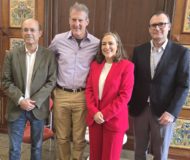

The Hospital de Sant Pau and the Institut de Recerca Sant Pau (IR Sant Pau), together with the Universitat Autònoma de Barcelona (UAB), hosted on Wednesday, November 5, one of the sessions of the Nobel Prize Inspiration Initiative (NPII), an international program that brings the experience and insights of Nobel Laureates closer to students, early-career researchers, and science professionals. This edition, organized by Nobel Prize Outreach in collaboration with the AstraZeneca Foundation and several Catalan academic institutions, featured Professor Craig C. Mello, Nobel Laureate in Physiology or Medicine in 2006 for the discovery of the mechanism of RNA interference (RNAi).
The event began at Casa Convalescència, where the American laureate held an open discussion with students and young scientists titled “What it takes to be a scientist?”, moderated by Adam Smith from Nobel Prize Outreach. The session opened with institutional greetings from Professor Albert Selva, Dean of the Faculty of Medicine at the Universitat Autònoma de Barcelona (UAB), and Susana García, Head of Institutional Relations at the AstraZeneca Foundation.
The session concluded with remarks by Dr. Jordi Surrallés, Director of IR Sant Pau and Professor of Genetics at UAB, who highlighted the value of such gatherings in fostering scientific vocations. “Welcoming a Nobel Laureate to Sant Pau is a privilege that reminds us that research is built on curiosity, perseverance, and teamwork. Initiatives like this inspire new generations of researchers and strengthen our commitment to scientific excellence and international collaboration,” noted Dr. Surrallés.
The program then moved to the Hospital de Sant Pau, where Craig Mello delivered his lecture, “RNAi: A Molecular Spark in an Information Inferno.” The session was opened by Assumpció Malgosa, Vice-Rector for Research at UAB; Xavier Prats Monné, President of the Board of Trustees of the Hospital de la Santa Creu i Sant Pau Foundation; and Susana García from the AstraZeneca Foundation. The event also featured an engaging discussion with the audience, once again moderated by Adam Smith.
“Barcelona’s innovative and collaborative scientific community is ready to play an increasingly important role in the revolution connecting human genetics to transformative treatments. It’s exciting to be here to share what we’ve learned about RNA—and to listen! Because, as someone once said, the ideas that change the world often come from young scientists who haven’t yet discovered what’s impossible,” said the American Nobel Laureate.
Professor Craig C. Mello is a researcher at the RNA Therapeutics Institute at the University of Massachusetts Medical School (United States) and co director of the RNA Cell Biology Program at the Howard Hughes Medical Institute. In 2006, he was awarded the Nobel Prize in Physiology or Medicine, together with Andrew Z. Fire, for the discovery of the phenomenon of RNA interference (RNAi), a natural process through which cells regulate gene expression by silencing specific RNA sequences.
Until then, RNA was thought to play only a passive role as a messenger between DNA and proteins. Mello and Fire’s discovery transformed this view by demonstrating that RNA is also a key player in controlling genetic information. Their work revolutionized modern molecular biology and was essential to understanding how to manipulate RNA safely and effectively, paving the way for the development of multiple innovative RNA-based therapies.
This knowledge has led to advances ranging from gene-silencing therapies to new strategies for drug design and RNA-based vaccines, such as the mRNA vaccines developed against COVID-19. Today, RNAi research continues to expand its applications in the treatment of genetic, infectious, cardiovascular, and oncological diseases, as it allows precise modulation of the genes involved in disease progression.